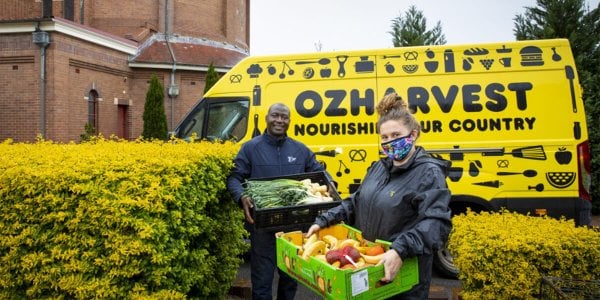The cost-of-living crisis: Why can't nurses and teachers afford groceries anymore?
- Replies 28
It’s hard not to notice the rise in the cost of living over the years – and we're not just talking about the days of lower petrol prices and affordable real estate.
The current cost of living crisis in Australia has reached an alarming level, impacting people from all walks of life, including professionals like nurses, teachers, and even lawyers.
A recent line-up at a free supermarket in Sydney speaks volumes about the growing struggle to afford basic necessities like groceries.
The OzHarvest a free supermarket in Waterloo – which offers fresh fruit, vegetables, and ready-made meals at no cost for those in need – has seen a noticeable increase in the number of professionals forced to rely on their services due to the escalating cost of living crisis.
While one might assume that food banks are only frequented by those who are homeless or on Centrelink benefits, the steady stream of professionals proves that this issue is affecting the lives of our so-called ‘working poor’.
And if these professionals are having a tough time stretching their budgets and feeding themselves, what about those who are on a pension or are self-funded retirees?
Inflation is currently at 7 per cent, the Reserve Bank of Australia (RBA) rates at 3.8 per cent, and the rising rental costs are all significantly diminishing the purchasing power of many Australian workers.
A disheartening study conducted by Suncorp found that 47 per cent of Aussies claim they cannot afford to properly fill their grocery trolleys in today's economic climate, with four in five Australians actively trying to reduce their food costs.
The diverse crowd waiting in line at the Waterloo market offers a stark reminder of how increasingly difficult it has become for ordinary Australians to make ends meet.
Among them is John, a senior lawyer who fell on hard times while battling alcoholism.
‘It was very humbling coming to a place like this, and I’ve fallen from lofty heights. I was highly respected, there was money galore and two divorces later, and thanks to my drinking, I’ve lost my money, and I’m coming here because I can’t afford to buy food anymore,’ he revealed.
He added that without OzHarvest, he ‘wouldn’t be eating’.
‘The people here are so non-judgmental, and you feel comfortable, and that is reassuring.’
Kat, a social worker for OzHarvest, observed a significant change in the demographics of those seeking help within the past year.
‘We are seeing plenty of professional workers coming in now. Teachers, nurses, lawyers, and they feel embarrassed they are here because they are working, but we say you are welcome because people don’t come here unless they really need to,’ she said.
‘Currently, it is the perfect storm. People are earning what they were earning two years ago, but now everything is more expensive, and they just can’t make ends meet anymore,’ she added.
The heart-wrenching stories shared by those who rely on the food bank highlight precisely how dire the situation has become for many. One teacher – a young mother of three – was unable to provide for her children on her part-time salary despite working four days a week.
Meanwhile, an international student pursuing a Master’s degree in Business credited the food bank as her lifeline because her unstable casual hours and exorbitant rent left her unable to pay for meals.
These stories shed light on the desperate need for a solution – whether short or long-term – to address the cost-of-living crisis that is sweeping across Australia. And if inflation continues to outpace wages, then this state of affairs will likely last for some time.
As we all know, help and support for one another is crucial in trying times like these. It's essential to keep informed about the ever-changing economic environment and look out for our community members – whether they're neighbours, family, or friends.
If you're in a position to do so, donating to organisations like Foodbank Australia, which provides vital support for those struggling, can make a lasting impact on the lives of many Australians.
You can also contribute to the OzHarvest Giving Day Appeal, whereby each dollar donated will provide four meals thanks to matched funding on June 22nd.
 What are your thoughts on this story, members? How has the rising cost of living hit you? Share your thoughts and experiences in the comments below.
What are your thoughts on this story, members? How has the rising cost of living hit you? Share your thoughts and experiences in the comments below.
The current cost of living crisis in Australia has reached an alarming level, impacting people from all walks of life, including professionals like nurses, teachers, and even lawyers.
A recent line-up at a free supermarket in Sydney speaks volumes about the growing struggle to afford basic necessities like groceries.
The OzHarvest a free supermarket in Waterloo – which offers fresh fruit, vegetables, and ready-made meals at no cost for those in need – has seen a noticeable increase in the number of professionals forced to rely on their services due to the escalating cost of living crisis.
While one might assume that food banks are only frequented by those who are homeless or on Centrelink benefits, the steady stream of professionals proves that this issue is affecting the lives of our so-called ‘working poor’.
And if these professionals are having a tough time stretching their budgets and feeding themselves, what about those who are on a pension or are self-funded retirees?
Inflation is currently at 7 per cent, the Reserve Bank of Australia (RBA) rates at 3.8 per cent, and the rising rental costs are all significantly diminishing the purchasing power of many Australian workers.
A disheartening study conducted by Suncorp found that 47 per cent of Aussies claim they cannot afford to properly fill their grocery trolleys in today's economic climate, with four in five Australians actively trying to reduce their food costs.
The diverse crowd waiting in line at the Waterloo market offers a stark reminder of how increasingly difficult it has become for ordinary Australians to make ends meet.
Among them is John, a senior lawyer who fell on hard times while battling alcoholism.
‘It was very humbling coming to a place like this, and I’ve fallen from lofty heights. I was highly respected, there was money galore and two divorces later, and thanks to my drinking, I’ve lost my money, and I’m coming here because I can’t afford to buy food anymore,’ he revealed.
He added that without OzHarvest, he ‘wouldn’t be eating’.
‘The people here are so non-judgmental, and you feel comfortable, and that is reassuring.’
Kat, a social worker for OzHarvest, observed a significant change in the demographics of those seeking help within the past year.
‘We are seeing plenty of professional workers coming in now. Teachers, nurses, lawyers, and they feel embarrassed they are here because they are working, but we say you are welcome because people don’t come here unless they really need to,’ she said.
‘Currently, it is the perfect storm. People are earning what they were earning two years ago, but now everything is more expensive, and they just can’t make ends meet anymore,’ she added.
The heart-wrenching stories shared by those who rely on the food bank highlight precisely how dire the situation has become for many. One teacher – a young mother of three – was unable to provide for her children on her part-time salary despite working four days a week.
Meanwhile, an international student pursuing a Master’s degree in Business credited the food bank as her lifeline because her unstable casual hours and exorbitant rent left her unable to pay for meals.
These stories shed light on the desperate need for a solution – whether short or long-term – to address the cost-of-living crisis that is sweeping across Australia. And if inflation continues to outpace wages, then this state of affairs will likely last for some time.
As we all know, help and support for one another is crucial in trying times like these. It's essential to keep informed about the ever-changing economic environment and look out for our community members – whether they're neighbours, family, or friends.
If you're in a position to do so, donating to organisations like Foodbank Australia, which provides vital support for those struggling, can make a lasting impact on the lives of many Australians.
You can also contribute to the OzHarvest Giving Day Appeal, whereby each dollar donated will provide four meals thanks to matched funding on June 22nd.
Key Takeaways
- Nurses, teachers, and even lawyers are turning up at food banks in Australia due to the increasing cost-of-living crisis.
- Inflation, rising RBA rates, and increasing rental prices have led to 47 per cent of Aussies struggling to afford groceries and four in five actively trying to reduce food costs.
- OzHarvest’s free supermarket in Sydney’s Waterloo has seen a diverse crowd from various professions seeking free groceries.
- Stories of teachers, nurses, and others struggling to make ends meet highlight the extent of the problem and the need for support initiatives like OzHarvest.









